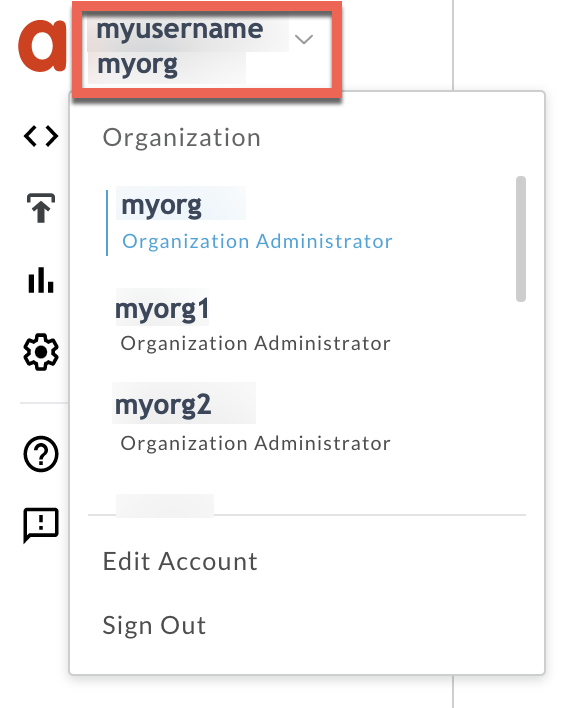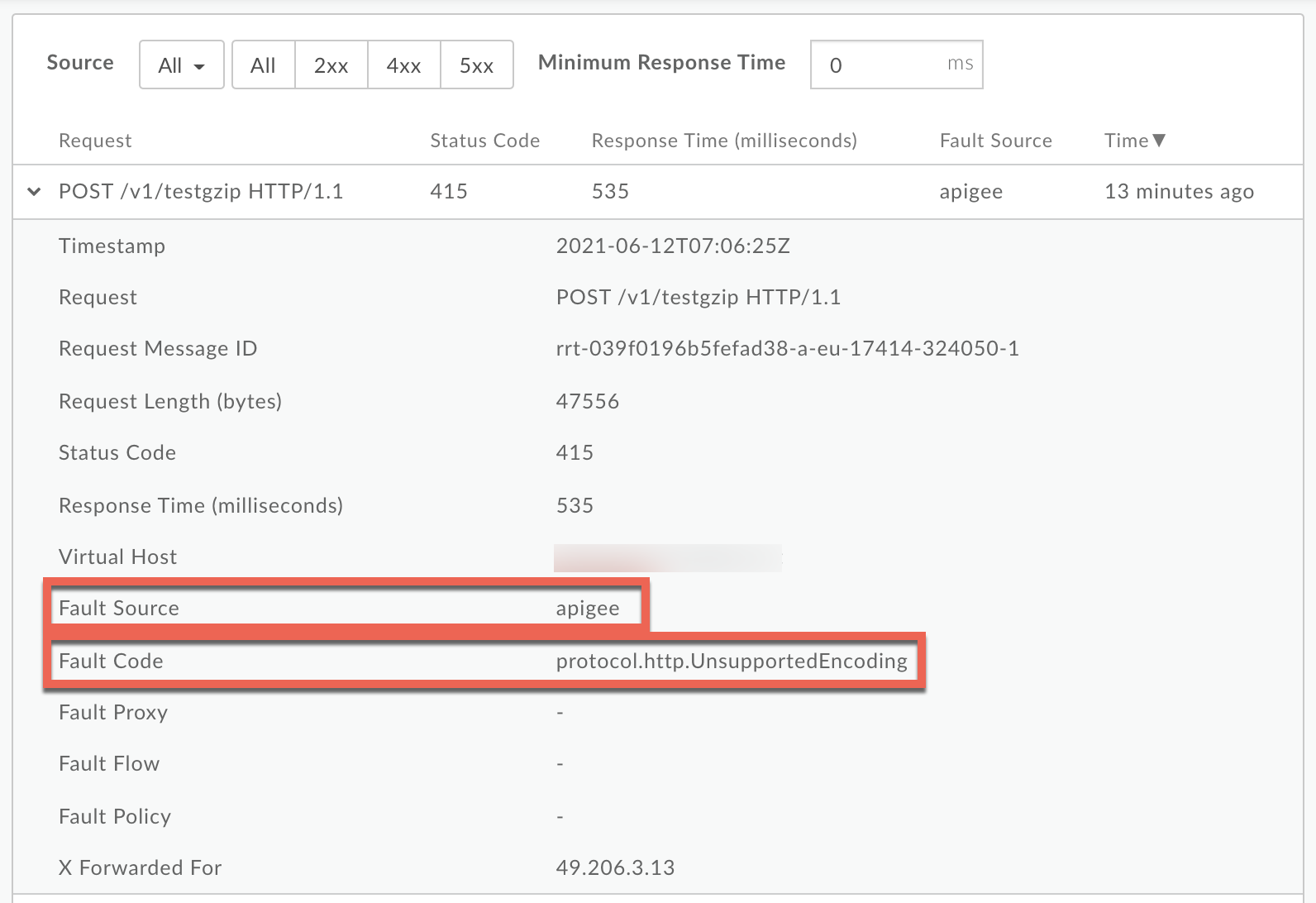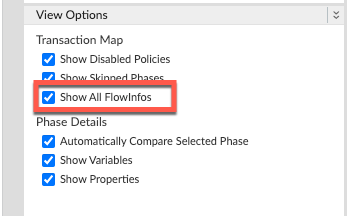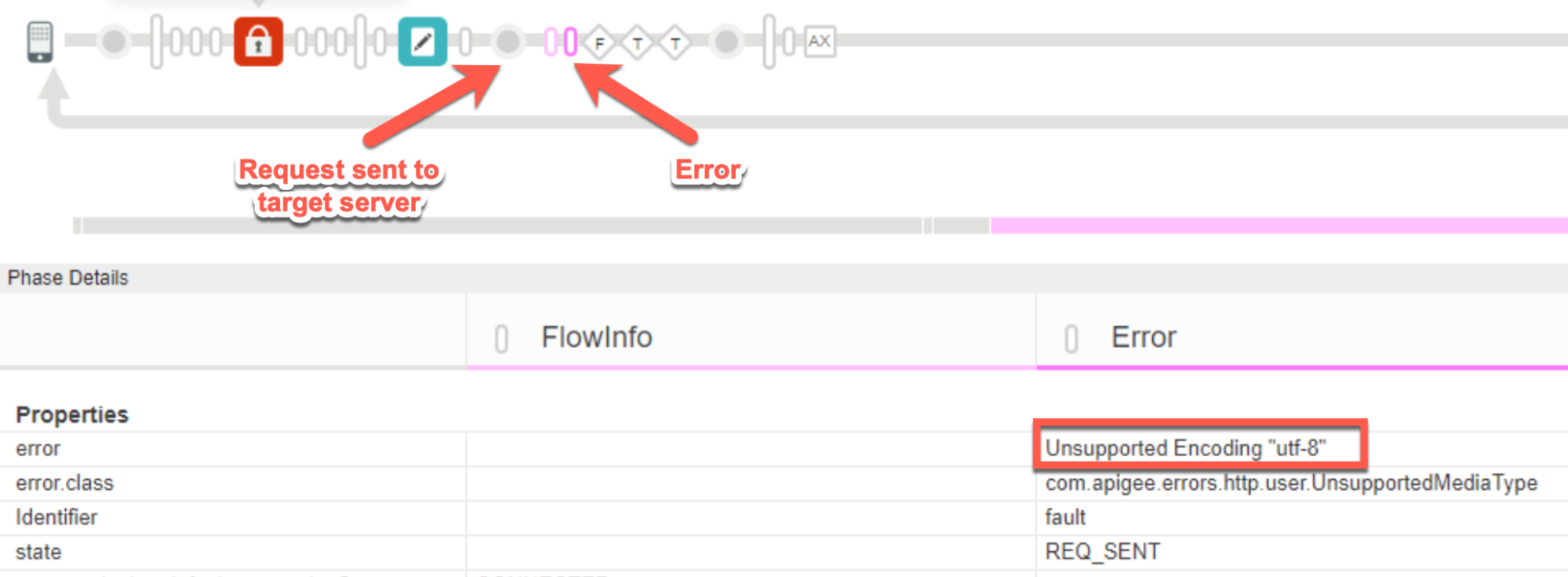You're viewing Apigee Edge documentation.
Go to the
Apigee X documentation. info
Symptom
The client application gets an HTTP status code of 415 Unsupported Media Type with
error code protocol.http.UnsupportedEncoding as a response to API calls.
Error message
Client application gets the following response code:
HTTP/1.1 415 Unsupported Media Type
In addition, you may observe an error message similar to the one shown below:
{
"fault":{
"faultstring":"Unsupported Encoding \"UTF-8\"",
"detail":{
"errorcode":"protocol.http.UnsupportedEncoding"
}
}
}Possible causes
This error occurs if the value of the Content-Encoding header specified either in
the HTTP request sent by the client to Apigee or HTTP response sent by the backend server to
Apigee doesn’t contain the
encoding supported by Apigee, as per the specification
RFC 7231, section 6.5.13: 415 Unsupported Media Type.
The possible causes for this error are as follows:
| Cause | Description | Troubleshooting instructions applicable for |
|---|---|---|
| Unsupported encoding used in request | The request header Content-Encoding contains encoding that is not supported
by Apigee Edge. |
Edge Public and Private Cloud users |
| Unsupported encoding used in response | The backend server response header Content-Encoding contains encoding that
is not supported by Apigee Edge. |
Edge Public and Private Cloud users |
Common diagnosis steps
To diagnose the error, you can use any of the following methods:
API Monitoring
To diagnose the error using API Monitoring:
- Sign in to your Apigee Edge account.
Switch to the organization in which you want to investigate the issue:

- Navigate to the Analyze > API Monitoring > Investigate page.
- Select the specific timeframe in which you observed the errors.
- Ensure that the Proxy filter is set to All.
- Plot Fault Code against Time.
Select a cell which has the fault code
protocol.http.UnsupportedEncodingas shown below:
Information about the fault code
protocol.http.UnsupportedEncodingis displayed as shown below:
Click View logs and expand one of the requests failing with
415error to view more information:
- From the Logs window, note the following details:
- Fault Source: This displays that the error is returned by
apigeeortarget. - Fault Code: This should match
protocol.http.UnsupportedEncoding.
- Fault Source: This displays that the error is returned by
- If the Fault Source is
apigee, then that indicates that the request contained unsupported encoding in theContent-Encodingheader. - If the Fault Source is
target, then that indicates that the backend server response contained unsupported encoding in theContent-Encodingheader.
Trace tool
To diagnose the error using the Trace tool:
- Enable the
trace session and either:
- Wait for the
415 Unsupported Media Typeerror to occur, or - If you can reproduce the issue, make the API call to reproduce
415 Unsupported Media Typeerror.
- Wait for the
Ensure that Show all FlowInfos is enabled:

- Select one of the failing requests and examine the trace.
- Navigate through different phases of the trace and locate where the failure occurred.
You will find the error typically in a flow after the Request sent to target server phase as shown below:

Note the value of the error from the trace.
The above sample trace shows the error as
Unsupported Encoding "utf-8". Since the error is raised by Apigee after the request was sent to the backend server, it indicates that the backend server sent the response headerContent-Encodingwith the value of"utf-8", which is not a supported encoding in Apigee.- Navigate to the AX (Analytics Data Recorded) Phase in the trace and click it.
Scroll down to the Error / Response Headers section in Phase Details panel and determine the values of X-Apigee-fault-code and X-Apigee-fault-source as shown below:

You will see the values of X-Apigee-fault-code and X-Apigee-fault-source as
protocol.http.UnsupportedEncodingandtarget, indicating that this error is caused because the unsupported encoding value of"utf-8"was passed by the backend server in the response headerContent-Encoding.Response Headers Value X-Apigee-fault-code protocol.http.UnsupportedEncodingX-Apigee-fault-source target- Check to see if you are using
proxy chaining; that is, if the target server/target endpoint is invoking another
proxy in Apigee.
To determine this, navigate back to the Request sent to target server phase. Click Show Curl.

- The Curl for Request Sent to Target Server window opens from which you can determine the target server host alias.
- If the target server host alias is pointing to a virtual host alias, then it is proxy
chaining. In this case, you need to repeat all the above steps for the chained proxy until
you determine what is actually causing the
415 Unsupported Media Typeerror. - If the target server host alias points to your backend server, then that indicates that your backend server is passing the unsupported encoding to Apigee.
Nginix access logs
To diagnose the error using NGINX access logs:
- If you are a Private Cloud user, then you can use NGINX access logs to determine
the key information about HTTP
415errors. Check the NGINX access logs:
/opt/apigee/var/log/edge-router/nginx/ORG~ENV.PORT#_access_log- Search for any
415Errors during a specific duration (if the problem happened in the past) or if there are any requests still failing with415. If you do find any
415errors with the X-Apigee-fault-code matching the value ofprotocol.http.UnsupportedEncoding, then determine the value of the X-Apigee-fault-source.Sample 415 error from NGINX access log:

The above sample entry from the NGINX access log has the following values for X- Apigee-fault-code and X-Apigee-fault-source:
Response Headers Value X-Apigee-fault-code protocol.http.Response405WithoutAllowHeaderX-Apigee-fault-source MPThe X-Apigee-fault-source could also have the value
target.
Cause: Unsupported encoding in request
Diagnosis
- Determine the Fault Code and Fault Source for the error observed using API Monitoring or NGINX access logs as explained in Common diagnosis steps.
- If the Fault Code is
protocol.http.UnsupportedEncodingand the Fault Source has the valueapigeeorMP, then this indicates that the request sent by the client application contains unsupported encoding in the request headerContent-Encoding. - You can determine the value of unsupported encoding passed as part of the HTTP request
using one of the following methods:
Error message
Using the error message:If you have access to the complete error message received from Apigee Edge, then refer to the
faultstring. Thefaultstringcontains the value of the unsupported endcoding.Sample Error Message:
"faultstring":"Unsupported Encoding \"UTF-8\""
In the above error message, notice that the value of the unsupported encoding is
“UTF-8”as seen in thefaultstring.Since
“UTF-8”is not a supported encoding in Apigee Edge, this request fails with the415 Unsupported Media Typeerror with the error code:protocol.http.UnsupportedEncoding.
Actual request
Using the actual request:- If you don’t have access to the actual request made by the client application, then go to Resolution.
- If you have access to the actual request made by the client application, then perform the
following steps:
- Determine the value passed to the request header
Content-Encoding. - If the value passed to the request header
Content-Encodingis not one of the values listed in Supported encoding, then that’s the cause for this error.Sample request:
curl -v "https://HOSTALIAS/v1/testgzip" -H "Content-Encoding: UTF-8" -X POST -d @request_payload.gz
The above sample request sends the value
"UTF-8"to theContent- Encodingheader, which is not a Supported Encoding in Apigee Edge. Therefore, this request fails with415 Unsupported Media Typeerror with the error code:protocol.http.UnsupportedEncoding.
- Determine the value passed to the request header
Resolution
- Refer to the list of encoding supported by Apigee in Supported encoding.
- Ensure that the client application always sends the following:
- Only the supported encoding as the value to the
Content-Encodingheader in the request - The request payload in the supported format to Apigee Edge and matches the format
specified in
Content-Encodingheader
- Only the supported encoding as the value to the
In the above example, the request payload has a
gzextension which indicates that the content must begzip. You can fix the issue by sending the request header asContent-Encoding: gzipand the request payload ingzipformat:curl -v "https://HOSTALIAS/v1/testgzip" -H "Content-Encoding: gzip" -X POST -d @request_payload.gz
Cause: Unsupported encoding in response
Diagnosis
- Determine the Fault Code and Fault Source for the error observed using API Monitoring, Trace Tool or NGINX access logs as explained in Common diagnosis steps.
- If the Fault Source has the value
target, then this indicates that the response sent by the backend server contains unsupported encoding in theContent-Encodingheader. - You can determine the value of unsupported encoding passed as part of the HTTP response from
the backend server using one of the following methods:
Error message
Using the error message:If you have access to the complete error message received from Apigee Edge, then refer to the
faultstring. Thefaultstringcontains the value of the unsupported encoding.Sample error message:
"faultstring":"Unsupported Encoding \"UTF-8\""
-
In the above error message, notice that the value of the unsupported encoding is
“UTF-8”as seen in thefaultstring.Since
“UTF-8”is not a supported encoding in Apigee Edge, this request fails with415 Unsupported Media Typeerror with the error code:protocol.http.UnsupportedEncoding.
Trace tool
Using Trace:- If you do not have the trace for the failing request, then go to Resolution.
- If you have captured a trace for the failure, then you can determine the unsupported
encoding passed by the backend server as part of the
Content-Encodingresponse header as explained in Trace tool.
Resolution
- Refer to the list of encoding supported by Apigee in Supported encoding
- Ensure that the backend server always sends the following:
- Only the supported encoding as the value to the
Content-Encodingheader in the request - The response payload in the supported format to Apigee Edge and matches the format
specified in
Content-Encodingheader
- Only the supported encoding as the value to the
Supported encoding
The following table lists the encoding format supported by Apigee Edge:
| Header | Encoding | Description |
|---|---|---|
Content-Encoding |
gzip |
The Unix gzip format |
deflate |
This format uses zlib structure with deflate compression algorithm. |
Specification
Apigee responds with the 415 Unsupported Media Type error response as per the
following RFC specification:
| Specification |
|---|
| RFC 7231, section 6.5.13: 415 Unsupported Media Type |
Key points to note
Note the following:
- If the
415error is returned by Apigee due to unsupported encoding passed in theContent-Encodingheader as part of the API request, then:- You will not be able to capture the trace for such requests.
-
You will not be able to modify the format or the content of the error response sent by Apigee Edge using the policies such as RaiseFault, AssignMessage.
This is because this error occurs at an early phase in the Message Processor before any policy can be executed.
- If the
415error is returned by Apigee due to unsupported encoding passed in the response header from your backend server, then it has to be fixed in the backend server to avoid this error. Please work with your backend team as appropriate to fix this issue.
If you still need any assistance from Apigee Edge Support, go to Must gather diagnostic information.
Must gather diagnostic information
If you still need any assistance from Apigee Support, gather the following diagnostic information, and then contact Apigee Edge Support:
If you are a Public Cloud user, provide the following information:
- Organization name
- Environment name
- API Proxy name
- Complete
curlcommand used to reproduce the415error - Trace file for the API requests
If you are a Private Cloud user, provide the following information:
- Complete error message observed for the failing requests
- Environment name
- API Proxy bundle
- Trace file for the API requests
NGINX access logs
/opt/apigee/var/log/edge-router/nginx/ORG~ENV.PORT#_access_logWhere: ORG, ENV and PORT# are replaced with actual values.
- Message Processor system logs
/opt/apigee/var/log/edge-message- processor/logs/system.log
